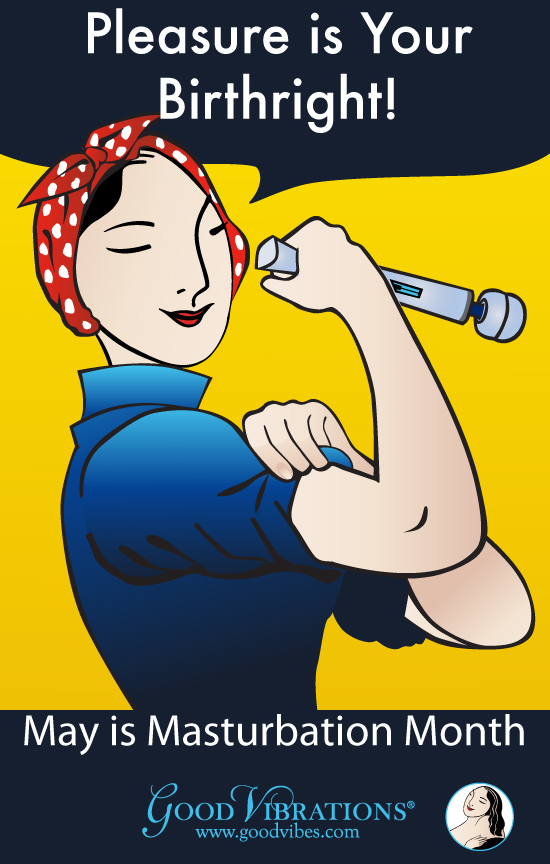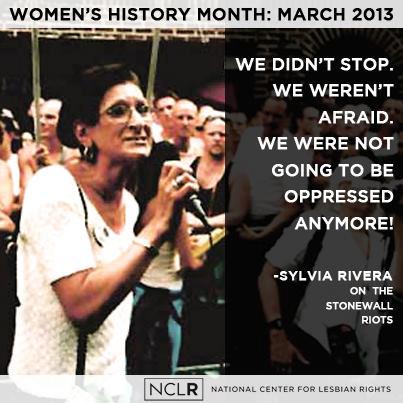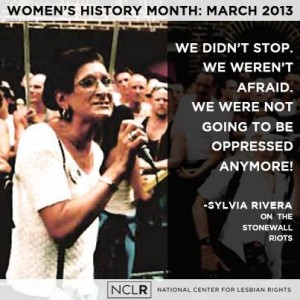What better way to summon the season of twitterpating than by celebrating May Masturbation Month! Here are some fun facts about Annual– now International- Month of Masturbation and some great links to help you…participate.

1) The true poster child of Masturbation Month is former US Surgeon General Jocelyn Elders. Following a speech at the 1994 UN World AIDS Day, Elders was asked about masturbation as a way to discourage youth from engaging in partnered sex. She responded, “I think it is something that is part of human sexuality and a part of something that perhaps should be taught” (EmpowerHer, 2010). Gasp! The result: Elder was forced to resign from government.
But this sex shaming and conservative wrath backfired with a whole month dedicated to public talks, workshops, dancings, plays of all thing Masturbation! Thanks to Good Vibrations, the guru of sex toy shops. National Masturbation Month aims to encourage people to talk freely about it, to end the guilt associated with it and dispel the notion that it is “second-best” to “real” sex (Good Vibes’ official statement).
2) The celebration of #radical self-love has taken place every year since. The ever-so-climatic Masturbate-A-Thon is its biggest fundraiser. It encourages people to collect pledges and raise funds for sex-positive non-profits. Masturbate-A-Thon was originally hosted in San Francisco by Good Vibration and has spread to other cities like Portland OR, Washington D.C., London, England, and Copenhagen, Denmark. For it’s 14th Anniversary, the Thon will be held in Philly, PA, and funds will be used to benefit local LGBTQ inclusive sex-ed organizations, Pleasure Rush! and ScrewSmart. These guys established a CrowdRise fundraiser to help raise $3,000 from 1 May to May 27th, 2013, in order to help pay for the end of the month party, festively named Creamium.
Both Pleasure Rush! and ScrewSmart believe that the Philly Masturbate-A-Thon 2013 has the power to deliver the following:
-Reduce stigma and shame around sexuality.
-Promote sexual health Create a community of dialogue around the importance of pleasure. -Give you an excuse to jerk off for hours!” (Crowdraise).

3) In honor of International Masturbation Month, the Center for Sex & Culture (CSC) in conjunction with Shilo McCade’s “I Masturbate…” photo exhibition (summary about the photo project), is facilitating a writing class on the power of masturbation. Participants will spend a few hours writing response to photos and sharing stories about orgasms, self-love, and other aspects of sexuality. Proceeds support the CSC.
4) Ever heard of Betty Dodson? She is only the Queen of Masturbation and a pioneer in sexual liberation. Here is a great article by a woman who attended one of Betty’s 5-hour masturbation workshops and learned new types and ways of orgasm.
5) The student run news source, The Interloper @ USC is running its first ever masturbation writing contest. Winner gets a vibrator. You can read the first story: You Are Sleeping Inside Me.
6) Think you’re a master of masturbation? Test your knowledge with this 14 question quiz!
Taboo History Brief: Why we should celebrate

Masturbation Month is growing in profile but it stems from a long history of societal hush-hush syndrome. In fact, masturbation didn’t receive any attention on prime time television until Seinfeld brought up the taboo topic in 1992. In the episode (wikilink), George Constanza is caught by his mother masturbating. He confesses to Jerry, Elaine and Kramer and the conversation results in the four entering a contest to determine who can go for the longest period of time without masturbating.
No one wins. What’s interesting is that while the topic is quite blatant and insinuates that everyone masturbates (often!), the word “masturbation” could not actually be spoken. NBC thought the topic wasn’t suitable for TV, so the taboo is described in a series of hilarious euphemisms.
As Good Vibrations writes, “Almost everyone masturbates, but all too few of us are willing to admit to enjoying this simple pleasure – mostly because of the taboo against masturbation in our society, which has its roots in historical misconceptions that have survived to the present day.” During the 18th, 19th, and 20th century in Europe and America, masturbation was believed to be a debilitating wastes on energy that could result in exhaustion, impotence, insanity, epilepsy, etc. People obsessed over ways to prevent and treat the destructive urge.
For example, Dr. John H Kellogg advocated that circumcision should be performed with no anesthesia in order to deter children from “self-abuse” (cracked.com). Yes, this is Kellogg of the Kellogg’s cereal. Grape-Nuts, and later Corn Flakes, were invented to prevent “fire in the blood”. As early as the 1800s, masturbation experts believed that certain foods stimulated the urge, so people were recommended certain diets that eliminated instigators like pickles, candy, and eggs, and designed non-stimulating alternatives like cold breakfast cereal.
For more investigation into the rabbit hole of bizarre anti-masturbation treatments, Cracked.com offers a great article that covers all methods from Boy Scouts’ cold showers, to leeches, and spiked penile rings, bondage belts, and clitoridectomy.
So Happy Masturbation Month Everyone!
Let’s be thankful that our notions and acceptance of the deed has evolved from spiked penis restraints to Masturbate-A-Thon fundraisers! It’s great that there are many more sex positive resources out there that help normalize masturbation for us all. In some ways, it is a political act. It’s the ultimate safe sex, it increases awareness of your body and own sexual response, it relieves cramps, and it’s fun! So celebrate!
Do you have any fun facts or masturbation resources to share? Please comment below.
It’s always nice to know if you like what you’ve read. Please let us know by tweeting this or liking us on Facebook.
Special thanks to Good Vibrations, BlogHer, EmpowerHer, and Bitch Mag for the images and information.


